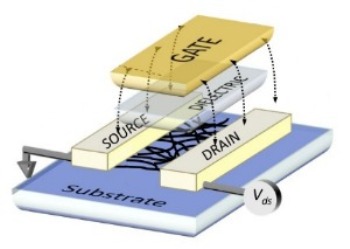Students in Peter Burke’s team at the University of California, Irvine along with graduate student, Nima Rouhi, have been observing transistors, which feature channels made using carbon nanotube ink.
The team is aiming to develop optimized techniques for manufacturing printable, flexible equipment at temperatures that do not affect plastic substrates.
 Burke lab
Burke lab
In spite of being tangled, these nanotube networks are efficient in transporting electrons from one tube to another through a channel. This characteristic has been utilized to manufacture simple equipment.
But, Rouhi says, they still haven’t understood how the nanotubes concentration in the channel affects the performance of the transistor. Initially, they could not comprehend whether the nanotube density would affect the transistor performance. The team discovered that transistors offered a wide range of properties in wafers, some needed more power when on and some were tough to turn off. Rouhi observed that the high-speed channels featured the maximum number of nanotubes.
The team controlled the surface properties of silicon wafer and the nanotube concentration in the ink, and discovered that they could exercise good control over the electronic properties of their equipment. Transistors with a low nanotube density have large on-off current ratios that are quite suitable for digital applications. The transistors featuring high-density channels offer high electron mobility, which is useful for use in radio frequency equipment like RFID tags.
The high-speed equipment developed by the team offered high electron mobilities of the order of 90 cm2/Vs, which is approximately 100 times higher than those offered by amorphous silicon utilized in thin film electronics and nearly four times the electron mobility offered by amorphous oxides. The complete details of the team’s research were recorded in Advanced Materials last year.
In general, with concentrations of nanotubes, the electrons traveled at faster speeds through transistor channels. The team discovered that when more than 100 nanotubes were packed within one square micron in a channel, the difference between the on current and off current of the transistor dropped sharply. The team hopes that high-purity inks and lesser pollutants in the channels could deliver better performance in transistors.